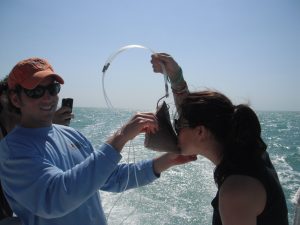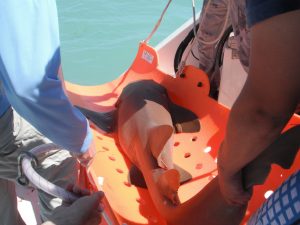Smooth Sweet Sunday
Sunday, March 27th 2011
After a very unlucky day on the water on Saturday, Captain Curt was determined to catch some sharks today, hopefully even a large bull shark, on our trip out to our site in Everglades National Park. He predicted that we were overdue for a large bull shark and that we would catch a good amount of lemon sharks. We had Summit Series’ event planners and coordinators on board with us, as well as a journalist from O magazine.
Before we left the dock, Dr. Hammerschlag explained our methods of fishing for sharks to the group and how and why sharks are in decline worldwide. The group, just a bit older than the high school groups we normally have aboard, were full of questions and very interested in the plight of sharks worldwide. Upon arrival at the Everglades National Park site, we started to put out our drumlines with the help of our visitors who kissed each piece of bait for good luck.
After eating lunch while letting our drumlines soak for about an hour, we returned to the first drumline, which had a small blacktip shark on the line! The whole group was excited to start the day off this way. The shark was brought on board and Dr. Hammerschlag, Captain Curt, the interns, and our guests set to work taking blood samples, muscle biopsies, measurements and placing tags on the shark.
RJD intern Austin Gallagher took blood, while our new folk on the boat were shown how to measure the animal, take a muscle biopsy and fin clip, and place a spaghetti tag and roto tag. After the blacktip was released, swimming away in excellent condition, we put the first drumline out again and continued on to the others.
We later pulled in a good-sized nurse shark and the group performed similar procedures on it as well. The only differences are that we do not perform a muscle biopsy, as the nurse shark’s skin is too tough, and we do not need to place the water pump in the shark’s mouth in order for it to breath, since these sharks are not ram ventilators. Nurse sharks are unlike other species of shark in that they do not need to keep moving in order to breathe, differentiating themselves in that respect from most of the other specimens we sample.
As the day continued we pulled in another nurse shark and two more blacktips. Our site in Everglades National Park is usually a fairly reliable spot for lemon sharks and greater numbers altogether, but Sunday’s trip did not yield either of those. This is yet another demonstration of sharks declining worldwide, even in protected areas.
Hoping for better results on the next set of trips!
Much love,
Kyra Hartog, RJD Intern



Nice curtasling, def looks like it is VERY useful!